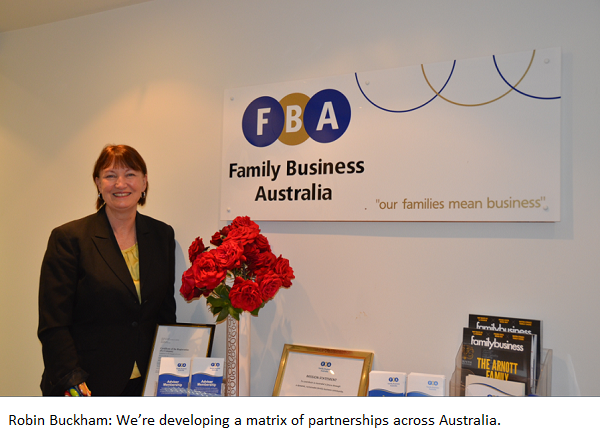Setting the agenda for family business
Robin Buckham knows more about the burning issues of family business than most family businesses.
After all, as chief executive of Family Business Australia, being immersed in the many complex, and often difficult, issues surrounding and governing family businesses across Australia is all in a day's work.
So are regular discussions with senior government officials, including ministers and Treasury officials, as well as from regulatory bodies including the Australian Tax Office, the Australian Securities and Investments Commission, and the Australian Competition and Consumer Commission.
In addition to being a member of the Small Business Advisory Council, overseen by federal Minister for Small Business Bruce Billson, Ms Buckham sits on a range of different committees as a representative of Australia's diverse family business community.
And diverse it most certainly is.
“Family business can be anything from the local fish and chip shop right up to someone like Gina Rinehart, or the Myers, and there's nothing small about them,” Ms Buckham says. “And we cross all industry sectors. While there is a large percentage of our members who might be deemed to be small business, it's not the totality of what we do.”

Ms Buckham says that it is evident there is a paucity of data around the family business sector overall, which the federal government and other departments are working to address.
“We are lucky to have a person in Bruce Billson who has actually been involved in a family business and really gets this space.”
The federal government announced earlier this year that it is transforming the Australian Small Business Commissioner into the Small Business and Family Enterprise Ombudsman, which it expects to be operational from July 1, 2015.
The Ombudsman will be a Commonwealth-wide advocate for small businesses and family enterprises, contribute to the development of small business friendly laws and regulations and also act as a concierge for dispute resolution.
“The fact that we have family enterprise in the name of a government entity means that other departments such as the Tax Office, Treasury, the ACCC and ASIC are very interested in what family business means,” Ms Buckham says. “These departments are starting to ask for data and Treasury has been meeting with the Australian Bureau of Statistics to see how we can start gathering this data.”
Ms Buckham says there is a genuine desire by the government to hear what people's views might be in relation to small and family business, and to listen to potential solutions.
Recently ATO Deputy Commissioner Michael Cranston and other representatives met with her in FBA's Melbourne office to discuss a wide range of taxation issues that impact the family business sector.
“There is a great desire to use organisations likes ours as conduits to talk about change and to provide useful information to make businesses more productive,” Ms Buckham says.
“With any opportunity to speak to government it is always more helpful to present, as far as possible, the problem and the potential solution rather than having a whinge. It gives you an opportunity to present some ideas to government so they can think about those.
“In all of these interactions, and particularly latterly with Treasury and the ATO, there is a huge desire that they provide helpful advice to people. You can see, just by looking at their websites, that there's quite a lot of useful stuff for business there.”
FBA currently has over 2,000 individual members, from about 1,000 separate businesses, but, as the peak body in the family business space, its focus is on assisting the sector as a whole, offering services such as education programs to the wider sector. This has involved forming a range of partnerships across the broader business community.
For example, FBA is partnering with selected business organisations to provide additional educations programs, and with Philanthropy Australia to offer programs focused on corporate benevolence.
FBA also has a national partnership with global business services firm KPMG, which worked with FBA recently on a submission to the ATO regarding a review of the tax arrangements for small businesses. In addition, it has several state-level partnerships with Deloitte.
“Another very good partnership we've just developed is with the Bank of Melbourne in Victoria,” Ms Buckham says. “Our organisation hasn't traditionally had strong play in some of the ethnic communities and the Bank of Melbourne has those connections, so we're using that partnership to teach them about family business by training their relationship managers, and they're helping us to expand our reach and out knowledge in some of the sectors that we haven't been strong in.
“We're developing a matrix of partnerships across Australia.”
Ms Buckham says that since she started in February, she has been on a learning curve about family business and about the associations space, of which there are hundreds. She also has spent considerable time working on improving the internal processes of FBA.
“Just because we're a family business not for profit doesn't mean we're not a professionally run organisation,” she says. “We've been working on issues around streamlining what we do and making ourselves as sharp as possible to give the best service to the sector.”













